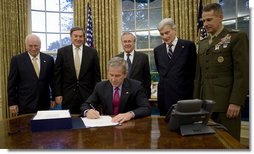
- Afghanistan
- Africa
- Budget Management
- Defense
- Economy
- Education
- Energy
- Environment
- Global Diplomacy
- Health Care
- Homeland Security
- Immigration
- International Trade
- Iraq
- Judicial Nominations
- Middle East
- National Security
- Veterans
|
Home >
News & Policies >
October 2006
|
For Immediate Release
Office of the Press Secretary
October 17, 2006
President's Statement on H.R. 5122, the "John Warner National Defense Authorization Act for Fiscal Year 2007"
Today, I have signed into law H.R. 5122, the "John Warner National Defense Authorization Act for Fiscal Year 2007" (the "Act"). The Act authorizes funding for the defense of the United States and its interests abroad, for military construction, for national security-related energy programs, and for maritime security-related transportation programs.
 Several provisions of the Act call for executive branch officials
to submit to the Congress recommendations for legislation, or purport to
regulate the manner in which the President formulates recommendations to
the Congress for legislation. These provisions include sections 516(h),
575(g), 603(b), 705(d), 719(b), 721(e), 741(e), 813, 1008, 1016(d),
1035(b)(3), 1047(b), and 1102 of the Act, section 118(b)(4) of title 10,
United States Code, as amended by section 1031 of the Act, section 2773b
of title 10 as amended by section 1053 of the Act, and section 403 of
the Ronald W. Reagan National Defense Authorization Act for Fiscal Year
2005 (Public Law 108-375) as amended by section 403 of the Act. The
executive branch shall construe these provisions in a manner consistent
with the President's constitutional authority to supervise the unitary
executive branch and to recommend for the consideration of the Congress
such measures as the President deems necessary and expedient.
Several provisions of the Act call for executive branch officials
to submit to the Congress recommendations for legislation, or purport to
regulate the manner in which the President formulates recommendations to
the Congress for legislation. These provisions include sections 516(h),
575(g), 603(b), 705(d), 719(b), 721(e), 741(e), 813, 1008, 1016(d),
1035(b)(3), 1047(b), and 1102 of the Act, section 118(b)(4) of title 10,
United States Code, as amended by section 1031 of the Act, section 2773b
of title 10 as amended by section 1053 of the Act, and section 403 of
the Ronald W. Reagan National Defense Authorization Act for Fiscal Year
2005 (Public Law 108-375) as amended by section 403 of the Act. The
executive branch shall construe these provisions in a manner consistent
with the President's constitutional authority to supervise the unitary
executive branch and to recommend for the consideration of the Congress
such measures as the President deems necessary and expedient.
The executive branch shall construe sections 914 and 1512 of the Act, which purport to make consultation with specified Members of Congress a precondition to the execution of the law, as calling for but not mandating such consultation, as is consistent with the Constitution's provisions concerning the separate powers of the Congress to legislate and the President to execute the laws.
A number of provisions in the Act call for the executive branch to furnish information to the Congress or other entities on various subjects. These provisions include sections 219, 313, 360, 1211, 1212, 1213, 1227, 1402, and 3116 of the Act, section 427 of title 10, United States Code, as amended by section 932 of the Act, and section 1093 of the Ronald W. Reagan National Defense Authorization Act for Fiscal Year 2005 (Public Law 108-375) as amended by section 1061 of the Act. The executive branch shall construe such provisions in a manner consistent with the President's constitutional authority to withhold information the disclosure of which could impair foreign relations, the national security, the deliberative processes of the Executive, or the performance of the Executive's constitutional duties.
The executive branch shall construe as advisory section 1011(b)(2) of the Act, which purports to prohibit the Secretary of the Navy from retiring a specified warship from operational status unless, among other things, a treaty organization established by the U.S. and foreign nations gives formal notice that it does not desire to maintain and operate that warship. If construed as mandatory rather than advisory, the provision would impermissibly interfere with the President's constitutional authority to conduct the Nation's foreign affairs and as Commander in Chief.
The executive branch shall construe section 1211, which purports to require the executive branch to undertake certain consultations with foreign governments and follow certain steps in formulating and executing U.S. foreign policy, in a manner consistent with the President's constitutional authorities to conduct the Nation's foreign affairs and to supervise the unitary executive branch.
As is consistent with the principle of statutory construction of giving effect to each of two statutes addressing the same subject whenever they can co-exist, the executive branch shall construe section 130d of title 10, as amended by section 1405 of the Act, which provides further protection against disclosure of certain homeland security information in certain circumstances, as in addition to, and not in derogation of, the broader protection against disclosure of information afforded by section 892 of the Homeland Security Act of 2002 and other law protecting broadly against disclosure of such information.
GEORGE W. BUSH
THE WHITE HOUSE,
October 17, 2006.
# # #


